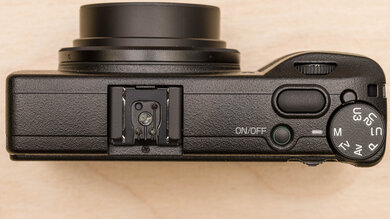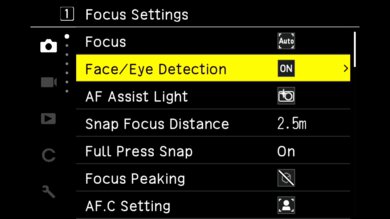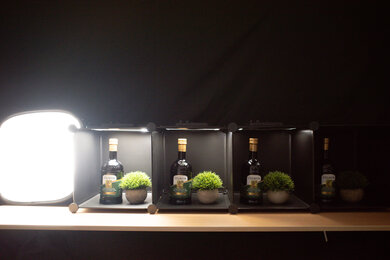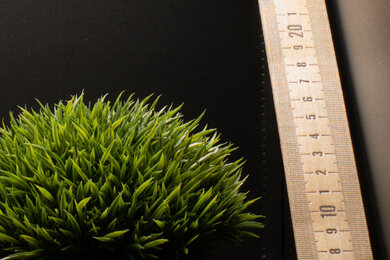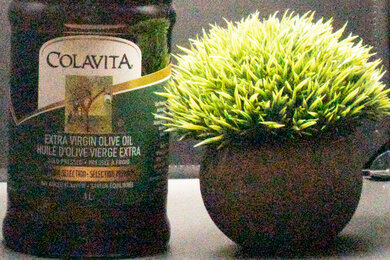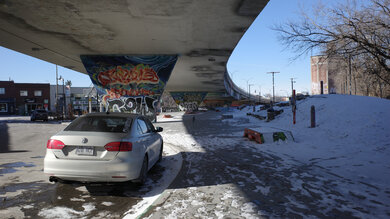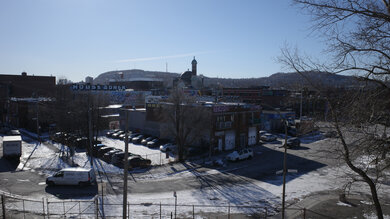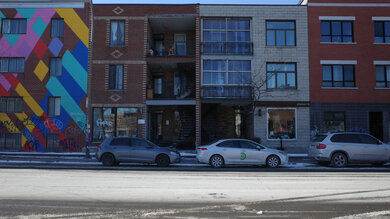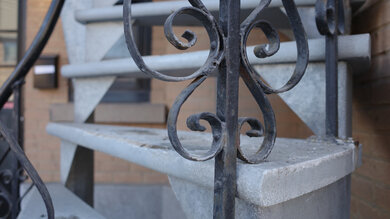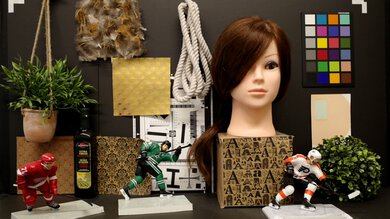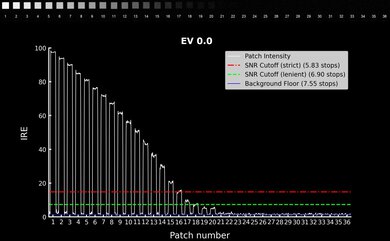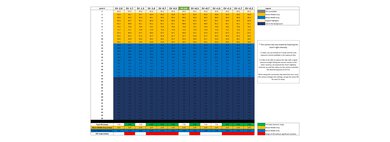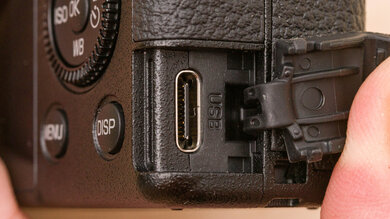The RICOH GR III is a compact point-and-shoot camera with an incredibly portable and minimalist design that makes it a street photographer's dream. While it may look unassuming and pared-down, it's fitted with a relatively large APS-C sensor, built-in stabilization, and a built-in neutral density (ND) filter. Its built-in lens has a 28mm full-frame equivalent focal length that's ideal for street scenes or everyday moments, and unique features like 'Snap Focus' make it easy to capture fleeting moments discreetly. Of course, its compact size means a short battery life, and while it can technically record 1080p video, it's really more of a photography-first camera.
Our Verdict
The RICOH GR III is decent for travel photography. It delivers excellent image quality and performs well even in low light. It's remarkably compact and easy to take with you on the go. It also feels well-built and has a very bright screen that can easily overcome glare in sunny conditions, though it lacks a viewfinder. Unfortunately, its battery life is poor, and its autofocus system isn't very reliable at tracking moving subjects.
- Excellent image quality.
- Incredibly portable.
- Bright screen easily combats glare.
- Poor battery life.
- Unreliable autofocus.
- May be uncomfortable for those with larger hands.
The RICOH GR III is great for landscape photography. It delivers excellent overall image quality and has great dynamic range to bring out a wider range of detail in landscape shots. While its built-in lens has a fixed focal length, it has a wide enough field of view for landscapes, and its built-in neutral density filter can help you take longer exposure shots. It's also remarkably compact, so it's easy to take with you to remote shooting locations. However, its minimalist design may not be the most comfortable to shoot with, depending on your ergonomic preferences.
- Excellent image quality.
- Incredibly portable.
- Built-in ND filter.
- Great dynamic range.
- Poor battery life.
- May be uncomfortable for those with larger hands.
The RICOH GR III isn't suitable for sports and wildlife photography. While it delivers excellent image quality, it has a limited continuous shooting mode that can only shoot at 4 fps. Its fixed focal length isn't well-suited to this use since you can't zoom in on far-away subjects, and depending on what aperture you use, its shutter speed is also limited and may not be fast enough for very quick action.
- Excellent image quality.
- Incredibly portable.
- Feels well-built.
- Poor continuous shooting speed.
- Fixed focal length.
- Unreliable autofocus.
- Shutter speed is limited depending on aperture setting.
The RICOH GR III isn't suitable for vlogging. While it's very portable and easy to carry around, it can't shoot in 4k, and its FHD video quality is underwhelming. It also has a fixed screen, so you can't monitor yourself while recording. Also, its autofocus system doesn't support any tracking features in video, making it nearly impossible to keep yourself in focus while vlogging with the lens facing you. It also tends to overheat and shut down when recording continuously for longer periods.
- Incredibly portable.
- Fixed screen.
- Can't shoot 4k video.
- Poor FHD video quality.
- Doesn't support auto tracking.
- Battery overheats easily when recording video.
The RICOH GR III isn't suitable for studio video. It can't shoot video in 4k, and its FHD video quality is poor. It doesn't support autofocus tracking when shooting video either, and it only has a USB-C port, with no HDMI port, microphone jack, or headphone jack. It has a limited recording time limit and tends to overheat and shut down when recording for longer periods.
- Incredibly portable.
- Can't shoot 4k video.
- Poor FHD video quality.
- Doesn't support auto tracking.
- Battery overheats easily when recording video.
The RICOH GR III isn't suitable for action video usage. While it's very portable, it isn't designed for helmet or chest mounts. It's not rated to be water-resistant, either. It can only shoot video in FHD, and video quality is poor overall, with limited high-speed frame rate options.
- Incredibly portable.
- Can't shoot 4k video.
- Poor FHD video quality.
- Doesn't support auto tracking.
The RICOH GR III captures impressive RAW image quality. Its dynamic range is great, so it's quite well-suited to capturing high-contrast scenes. It also has good low-light noise handling for its class, and its f/2.8 lens is relatively bright among fixed-lens cameras. Images also look sharp and detailed, thanks to its high-resolution sensor.
- Great dynamic range.
- Relatively bright lens and good noise handling.
Performance Usages
Changelog
-
Updated Feb 07, 2025:
We added comparisons to the newly reviewed Leica D-Lux 8 and the Fujifilm X100VI in the Ergonomics section.
-
Updated Jan 27, 2025:
After conversion to Test Bench 0.13, we've added full text to this review and revised the existing text to bring the review up to our current standards of quality.
-
Updated Jan 16, 2025:
We added a mention of the Fujifilm X-M5 in the Built-In Lens section.
- Updated Dec 12, 2024: We've converted this review to Test Bench 0.13. We've added new tests for Video Dynamic Range and Luminosity Patch Detection. You can learn more about these updates in the changelog.
Check Price
Differences Between Sizes And Variants
The RICOH GR III regularly comes in one color: 'Black,' which is the version we tested. Here's our unit's label.
In addition to the standard 'Black' model, there are two special edition colorways, including the 'Street Edition,' which is metallic gray with an orange lens ring, and the 'Diary Edition,' which is a slightly warmer gray with a dark brown grip and silver lens ring. Each edition comes with special accessories, including color-coded leather straps, a canvas case (for the Diary Edition), and a color-coded external viewfinder (for the Street Edition).
The RICOH GR IIIx is the GR III's sister model. It differs solely because of its built-in lens, which has a 40mm equivalent field of view, as opposed to the GR III's wider 28mm field of view.
RICOH announced the RICOH GR III HDF and the RICOH GR IIIx HDF variants in 2024. The HDF variant includes a new 'Highlight Diffusion Filter' in the lens instead of the original model's ND filter. This filter softens and diffuses highlights to create a more dreamy, filmic quality to your images. In addition, the HDF model has a couple of new firmware features, including the ability to save up to three custom white balance pre-sets and a new 'Zone Select AF' area mode. These will eventually be added to the base models through firmware updates. The HDF model is physically differentiated from the base GR III with a silver shutter button.
Popular Camera Comparisons
The RICOH GR III is a compact fixed-lens camera. It's one of the smallest point-and-shoots with an APS-C sensor, with a far more pocketable size than the Fujifilm X100V, for example. There are few other point-and-shoot cameras on the market with sensors this large, with its only real competition being the Fujifilm X100 series and the Canon PowerShot G1X Mark III, which was discontinued. That said, the GR III's minimalist design won't be to everyone's taste, especially since it comes at the cost of forgoing a viewfinder and tilting screen.
For more options, check out our recommendations for the best point-and-shoot cameras, the best travel cameras, and the best cameras for street photography.
The RICOH GR III and the RICOH GR IIIx are identical cameras except for their built-in lenses. The GR III has a 28mm full-frame equivalent field of view, while the GR IIIx has a 40mm equivalent field of view. Which is better depends on which focal length you prefer to shoot at. The 28mm is wider and a bit better suited to landscapes or busier scenes that may require more coverage, while the 40mm is closer to the field of view of the human eye, making it versatile for a range of different subjects.
The Sony RX100 VII and the RICOH GR III are both excellent premium compact cameras, but they're aimed at different users. The Sony is more of an all-arounder, with a versatile zoom lens, tilting screen, pop-up EVF, and better video capabilities. Conversely, the RICOH is aimed more at street photographers and enthusiasts who care about image quality. It uses a larger sensor with better dynamic range and low-light performance and a prime lens, but otherwise, it lacks some of the frills and extras found on the Sony, with no viewfinder, no tilt-out screen, and very limited video features.
The RICOH GR III and the Fujifilm X100VI are both excellent point-and-shoot cameras. While they both fill a similar niche for those who want a premium compact camera for street photography, each one has its place—and its own vocal fanbase. The RICOH is significantly smaller and more portable, with a more unassuming design that makes it better for those who prefer to be discreet. The Fuji, meanwhile, is flashier, with more features, including a hybrid viewfinder, a tilting screen, and excellent video specs. The good news is that both cameras are capable of capturing excellent images.
The Fujifilm X100V is better overall than the RICOH GR III. Both cameras use APS-C sensors and deliver excellent image quality, but they use different focal lengths that may suit different preferences. The Fujifilm has a 35mm equivalent lens, while the RICOH has a 28mm equivalent lens, though it also comes in a GR IIIx variant with a 40mm lens. Otherwise, the Fujifilm camera offers more features, including a tilting screen, a hybrid viewfinder, a better autofocus system, and better video capabilities. However, the RICOH may suit you better if portability is a priority since it's much more compact than the Fuji.
Test Results

The RICOH GR III is incredibly portable and lightweight, especially considering it has an APS-C sensor and in-body image stabilization (IBIS). Even with its lens fully extended, it maintains a sleek profile. Of course, that portability comes at the expense of certain features, so there's no viewfinder or tilting screen. If you're looking for a highly compact camera but prefer an interchangeable lens design, consider the Fujifilm X-M5.
The camera has good overall build quality. It has a magnesium alloy chassis with a minimalist design. Most of the buttons feel solid, and the mode dial is rigid enough that you won't accidentally change modes. That said, the rear control wheel feels a bit flimsy, and the lens design means that dust and debris can get into the lens mechanism if you aren't careful. It also isn't weather-sealed.
The RICOH GR III has decent ergonomics. It'll feel cramped if you have larger hands, but considering how portable it is, the controls are well thought out, with two command dials and an exposure compensation switch, as well as several buttons, that can be customized to suit your preferences. The shutter button also provides good physical feedback. With all that, you can comfortably shoot the camera one-handed. The small bump and textured grip provide a secure hold as well, despite being very narrow. On the other hand, the fixed screen and lack of viewfinder are a bit limiting, especially if you want to shoot from the waist or from above. If you'd prefer a camera with a viewfinder and more physical controls, consider other premium compact cameras like the Leica D-Lux 8 or Fujifilm X100VI.
This camera doesn't have a viewfinder. If you prefer to compose photos through a viewfinder, consider the Fujifilm X100VI.
The screen is fixed, which is limiting if you like to shoot from different angles. It has a decent resolution, however, and gets very bright, which is necessary to ensure you can see the screen even on sunny days, since there's no viewfinder to rely on. You can use the touchscreen to navigate the menu, select focus points, or actuate the shutter.
The menu system is extensive, with a lot of different submenus and options. However, it uses simple language and is well-organized, making it easy to navigate. Pressing the 'ADJ' dial gives you access to a customizable quick menu, which is good for adjusting frequently used settings. Unfortunately, there's no guide or info function to explain settings in-camera, but thankfully, most settings are pretty straightforward.
The built-in lens has a fixed 28mm full-frame equivalent focal length, which is wide enough to give you more coverage in busier scenes but versatile enough for other subjects as well. It has a relatively wide max aperture of f/2.8, so you have some flexibility in low light, although it's one stop less than the lens on the comparable Fujifilm X100V. The lens also has a built-in neutral density (ND) filter that lets you shoot at slower shutter speeds for longer exposures or use a larger aperture than you would be able to otherwise when shooting in brighter conditions.
If you prefer to shoot with a narrower field of view, the RICOH GR IIIx is identical to the RICOH GR III except for its lens, which has a 40mm equivalent focal length. The newer HDF variants of each model also trade their ND filters for highlight diffusion filters.
The RICOH GR III is one of the few fixed-lens cameras with an APS-C sensor. It has a relatively high resolution and wide ISO range.
The camera's battery life is disappointing. It's CIPA-rated for about 200 shots on a full charge, which isn't much. Of course, given its compact size, that's to be expected. If you're taking it out for longer shooting days, you'll likely need a spare battery or power bank, though real-world usage will vary depending on your settings and how you use the camera.
In video mode, the battery life is atrocious. Shooting video drains the battery quite quickly, with just over half an hour of recording time before it dies. Even before you reach that point, the camera is likely to overheat and interrupt your recording as well. You also can't power the camera externally while recording.
The RICOH GR III only has one continuous shooting mode that shoots at 4 fps, and there's no electronic shutter option. It's quite slow, but if you're shooting in JPEG, the camera writes the photos to the SD card fast enough that you can effectively shoot indefinitely. If you shoot in RAW format, on the other hand, the buffer fills up after about 20 frames, which isn't much. Thankfully, the buffer is pretty quick to empty.
The camera's continuous autofocus tracking feature does a poor job of tracking moving subjects. With the camera's slow max burst rate and sluggish tracking, you're unlikely to get many in-focus frames with a quick subject. On top of that, you can't disable the image preview function, even when shooting continuously, which makes it a lot harder to track a subject in live view, as the previous shot is previewed in the display while shooting the next frame. Ultimately, this camera is not well-suited to that kind of continuous shooting.
Even without using the tracking feature, it's difficult to maintain focus on a moving subject when using a single center focus point. You'll get some usable frames, but given the camera's wider field of view, limited burst mode, and sluggish autofocus, it becomes tricky to maintain focus when a subject is moving.
That said, it does have a unique 'Snap Focus' feature that quickly 'snaps' the focus to a preset distance with a full press of the shutter when enabled. That means if you can reliably gauge your distance to a subject, you can easily capture quick in-focus snapshots.
Remarkably, given its compact size, the RICOH GR III features in-body image stabilization (IBIS). It's a 3-axis IBIS system, and it works really well to add some stability when shooting handheld. You can capture clear shots at very slow shutter speeds, which can be very helpful when shooting in low light. It's still worth noting that stabilization performance can vary depending on different factors, including how steady your hands are.
The dynamic range is great. It's quite well-suited to shooting high-contrast scenes, retaining a wide range of detail in both the shadows and highlights, though it isn't quite as good as most larger sensor cameras.
Note: At f/4, the camera's max shutter speed is 1/2500s. To measure the camera's dynamic range at a 1/4000s exposure time (with an ISO of 8000), we had to deviate from our usual methodology and use an aperture setting of f/5.6.
The camera captures very sharp photos, with a lot of fine detail. While you won't have as much leeway to crop in as higher-resolution sensors, you still have some room to crop without losing too much visible sharpness. We found that images are sharpest on this camera when its built-in lens is set to f/4.
The camera has fantastic noise management in low light, with remarkably clean photos at various exposure levels. We suspect this is because of in-camera noise reduction that can't be disabled. After updating the camera to firmware V1.81, our RAW noise test results improved and are more in line with those of the RICOH GR IIIx, with the same apparent noise reduction being applied to the camera's RAW files and skewing our dB measurements in Imatest.
The RICOH GR III has very limited video features. It can only record at up to 1080p resolution and doesn't have any advanced features like Log recording or even an HDMI port to connect an external display. When recording video, the camera also incurs a 1.2x crop compared to its photo mode.
The RICOH GR III can record FHD video at up to 60 fps, which is great if you want to record everything from more cinematic-looking footage to fast action or moderate slow-motion footage.
The camera doesn't have very impressive internal recording specs. Its bit rates are quite limited, so it can't record a very large amount of information. It also caps recording at 25 minutes or whenever your file reaches 4GB, depending on which you hit first. Even though it only records in 1080p, the camera is also prone to overheating, with about three overheating interruptions during the half hour or so during which we tested its video battery life.
While this camera supports continuous autofocus in video mode, it doesn't have any automatic tracking features, meaning the user has to manually select different focus points using the touchscreen. In 'Auto' mode, the focus kept chasing and pulsing, and it was difficult for the lens to establish focus, although the focus transitions were relatively smooth.
Video quality is poor overall. It's passable in brighter lighting conditions, but video still looks soft and somewhat grainy, with some chromatic aberration. In low light, footage is significantly noisy, with a lot of muddy-looking details.
The rolling shutter effect isn't too heavy. You'll still see some skewing or wobbling with quicker camera pans and movement, but it's relatively minimal otherwise.
The RICOH GR III has poor dynamic range in video. Its video features are extremely limited, and you can only shoot video in 'Program' mode, rather than having full manual exposure controls. For that reason, we had to adjust our methodology to measure the dynamic range by changing the camera's exposure compensation setting and measuring at different EV values rather than different ISO settings.
Ultimately, the camera simply can't capture a very wide range of shadows and highlights. You'll lose a lot of detail to noise in the shadows, and bright highlights will clip when shooting scenes with higher contrast or in challenging lighting conditions.
Tested settings:
- Resolution: 1080p
- Frame Rate: 30 fps
- Log Format: N/A
The camera's overall dynamic range is limited, and there's no manual exposure mode in video, so the amount of stops you'll get above and below middle gray stays roughly consistent no matter how you set the exposure compensation.
Tested settings:
- Resolution: 1080p
- Frame Rate: 30 fps
- Log Format: N/A
The camera has just a single SD card slot, rated for UHS-I cards, and it's located inside the battery compartment on the bottom of the camera. On top of that, it has about 2GB of internal memory, which may be useful if you run out of space on your SD card on the go.



